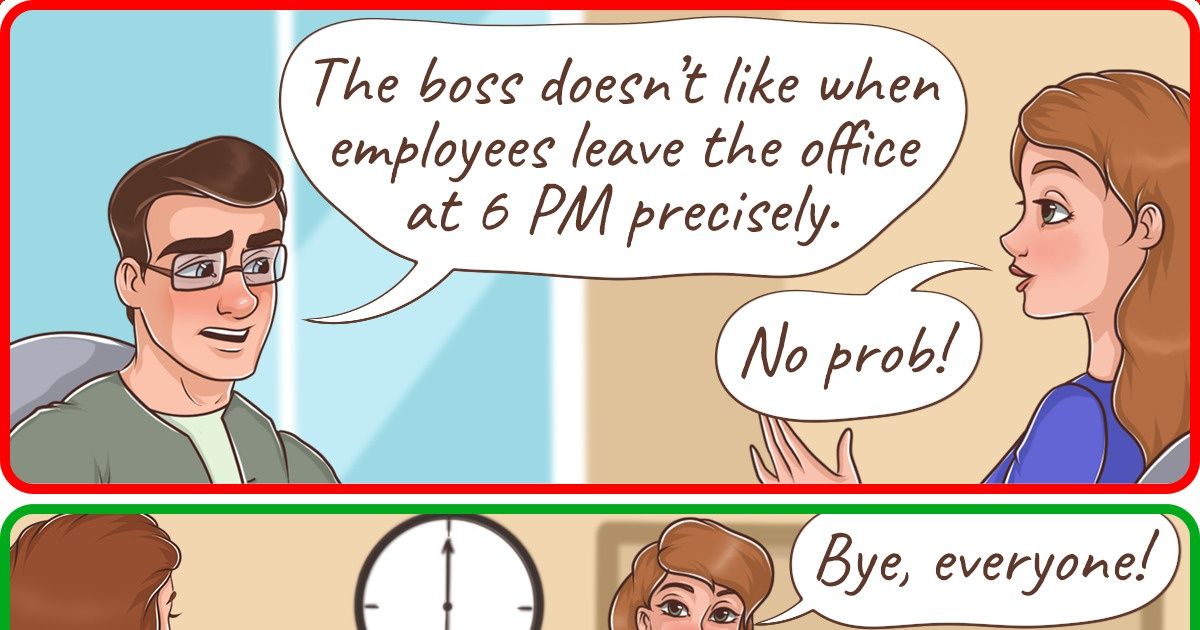The expectations of males to female workers, that smart casual outfits do NOT include a lowered bodice.
10 Unspoken Rules About Behavior at Work That Have Become Outdated

No matter what sphere you work in, there is a certain number of rules in any space. And we’re not talking about the ones that are set by the company itself (like coming to the office on time), but rather, the ones that exist between colleagues, employees, and bosses. Simply speaking, these exist as a way to dictate behavior between co-workers, and no one knows why.
We at Bright Side decided that it’s not necessary to follow some of these rules and that it’s even harmful sometimes. That’s why we’ve prepared some bright examples of such standards.
Being in touch 24/7

When your working day is over, you have the right to turn off your phone and not answer business messages and calls. However, some bosses are adamant that an employee should always be in touch.
Communicating with colleagues, even if you don’t want to

Not all colleagues evoke pleasant feelings in us, but still, sometimes we continue to listen to unnecessary conversations instead of staying in silence, being left alone. Being colleagues doesn’t equate to being friends, which is why politely saying that you are not into chit-chatting right now is nothing to be ashamed of — if you don’t want to talk, you don’t have to.
Striving for career growth

Every now and then, we hear that a successful person should continue to climb the career ladder. But if you like your position and your place of work, you don’t need to get down on yourself for not growing. Career growth isn’t the only sign of success, and oftentimes, people can be truly happy staying in the same position for years.
Staying longer at work because it’s “indecent to leave the office at 6 PM precisely”

It’s 6 PM, all working deals are done, and it’s time to go home. But your colleague or department manager chuckles disapprovingly, saying that they always stay at work at least 15 minutes longer. Well, if they want to do that, you don’t need to talk them out of it, but you yourself can go home right after your working day is over.
Keeping your opinions to yourself

Some people think that one shouldn’t express their opinion while on a team and it’s better to keep silent. It’s definitely not worth arguing with the boss because of some whim, but if the decisions made by your boss are illegal, harm someone’s health, or break the personal boundaries of an employee, you shouldn’t keep silent.
Feeling shy about discussing your salary with the boss

Another now-antiquated notion is the fear of discussing bonuses and salaries with your boss or potential employer. Some people feel shy to ask about money, even at the stage of the job interview — they believe the potential employer is only interested in money and that this will encourage them to hire another candidate. But why are people seeking jobs after all? Salary can and should be negotiated.
Leaving a previous job only after you find a new one

Some people might feel scared to leave without having a new job set up and prefer to tolerate unpleasant work conditions until they find a new one and feel confident in their future. This opinion is valid, as stability in work is important for sure. But when is it worth leaving a job without having a plan? There are many, including issues with you receiving your payment, a delayed salary, salary reductions, reductions in staff, or harmful actions taken by your boss or colleagues.
Having social media accounts that you don’t worry about your boss seeing

Our social media accounts are our personal space. And no matter what photos we post there, it doesn’t make us bad people. Whether you’re a teacher, a doctor, an engineer, or a kindergarten teacher — a person of any profession has the right to personal life. And posting a photo in a bikini is not a shameful thing to do, even for someone working in the science field.
Taking on extra duties for free

Managers and bosses sometimes like to tack on tasks that are out of their employees’ duties, while employees, especially new ones, want to start on the right foot and agree to these duties. But after doing this, they are simply unable to reject any extra work. It’s better to discuss such things at the beginning — if you are ready to take on extra work, your boss should be ready to pay for your time.
Keeping silent about your merits at work

There is another common opinion among working teams — there is no “me,” only “us.” But if there is an opportunity to show that it’s you who’s a great worker, don’t feel shy about it. Your skills and talents belong to only you, not to your team at work.
What unspoken rules at work would you like to cancel?
Comments
I usually neglect almost all of these "rules", though I feel rather uncomfortable sometimes about it ,but still neglecting 🤣
Related Reads
Nicole Kidman Wows in a Rare Appearance With Her Daughters — But One Detail Left People Worried

Angelina Jolie’s Latest Appearance Worries People: «She Looks Strange»

20 Girls Who Just Cut Their Bangs but Look Like They Got a Plastic Surgery

“He Has a Good Plastic Surgeon,” Mike Myers Leaves Fans Shocked in Rare Appearance

15 Celebrities I Honestly Didn’t Know Were a Couple

“He Needs Surgery,” Fans Urge Tom Cruise to Get Anti-Aging Procedures, As He Is Deemed Unrecognizable at 61

My MIL Mocked Me at My Husband’s Birthday Party—I Gave Her a Brutal Reality Check

10 Honest Stories That Capture the Struggles and Pain of Blended Families

I Refused to Beg My DIL for Forgiveness—Then Suddenly She Needed Me

I Refuse to Obey My Pregnant DIL’s Demand to Turn a Merry Christmas Into a Vegan One

I Refuse to See My Stepfather Again After He Tried to Cancel My Mom’s Savings

12 Stories That Had More Drama Than a Season Finale
